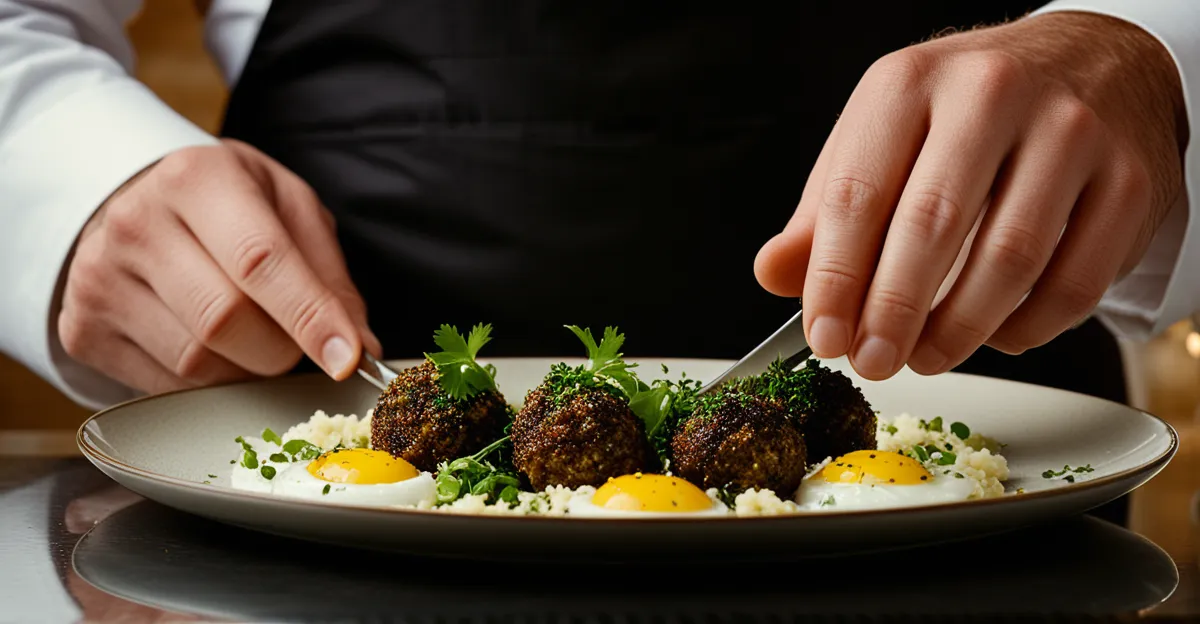Historical Context of British Culinary Techniques
The evolution of British cuisine has been a fascinating journey through the ages, marked by significant changes and influences. From its humble beginnings, British cooking history reflects a blend of traditions, cultures, and innovations.
Evolution of British Cuisine
Throughout the centuries, British culinary techniques have adapted and evolved. Initially, cooking methods were rudimentary, relying heavily on open hearths for roasting meats and baking bread. Over time, the introduction of new ingredients and spices, such as those brought back during the age of exploration, enriched the local cuisine.
Key Events Influencing Cooking Methods
Several key events played pivotal roles in shaping British cooking history. The Norman Conquest, for example, introduced a wealth of culinary techniques, including more sophisticated roasting methods and the use of herbs. The Industrial Revolution later brought technological advances in kitchen equipment, transforming traditional techniques with innovations like the iron range stove.
Role of Regional Ingredients
The diverse regional ingredients found throughout the UK have profoundly influenced traditional techniques. Each region boasts its own specialties, from the hearty stews of Scotland to the fresh seafood of coastal areas. This diversity has fostered a rich culinary heritage, showcasing the importance of local and seasonal produce in shaping the flavours and techniques integral to British cooking.
Key Traditional Techniques in British Cooking
The exploration of traditional British cooking reveals a rich tapestry of culinary techniques that have stood the test of time. These foundational methods are not just recipes; they are a testament to a way of life deeply intertwined with the land and its produce.
Roasting and Baking
Roasting and baking have long been pillars of traditional British cooking, showcasing the skill of transforming simple ingredients into hearty meals. Historically, these techniques were perfected over open fires, evolving into complex ovens that allowed for precise temperature control. This precision is essential in achieving the iconic Sunday roast, with its perfectly browned meat and fluffy Yorkshire puddings.
Preserving Methods
Preservation has played a crucial role in the British culinary tradition, essential for sustaining food supplies through harsh winters. Techniques such as pickling, salting, and curing not only extend shelf life but also enhance flavours, creating beloved staples like pickled onions and salted herring. Mastering these methods requires a balance of science and art, ensuring the preservation of both taste and texture.
Classic Sauces and Stock Preparation
In British cuisine, the preparation of classic sauces and stocks is a revered skill, underpinning many traditional dishes. Techniques for crafting rich, flavorful gravies and stocks have been handed down through generations, emphasizing the use of seasonal and local ingredients. The depth of flavour achieved from a well-executed stock or sauce can elevate a dish, highlighting the natural essences of the primary components.
Understanding these techniques offers a window into the culinary history of Britain, revealing a dedication to authenticity and craftsmanship that continues to influence modern interpretations of traditional dishes.
Insights from Prominent British Chefs
The realm of British chefs is rich with insights that bridge the gap between tradition and innovation. Esteemed chefs often emphasize the delicate balance between adhering to time-honored practices and embracing new techniques. This dialogue is not merely about keeping historical culinary techniques alive but expanding the possibilities within them.
Renowned chefs frequently discuss the importance of mentorship and culinary education in preserving these techniques. Many have trained young chefs, instilling in them the values of respect for traditional methods while encouraging creative freedom. This dual approach allows the legacy of traditional British cooking to flourish alongside innovative culinary trends.
In interviews, chefs like Jamie Oliver and Nigella Lawson share personal anecdotes that underline their commitment to preserving authentic culinary techniques. For instance, the use of local and seasonal ingredients is often highlighted as a cornerstone of authentic British cooking. These chefs advocate for sourcing sustainably, ensuring the longevity of traditional practices while minimizing environmental impact.
The narratives from these chefs provide compelling insights into the lasting significance of culinary techniques. Their collective wisdom underscores not only the practical skills involved but also the philosophical aspects of maintaining a connection to the past in the ever-evolving landscape of gastronomy.
Comparison of Traditional Techniques vs. Modern Innovations
The culinary world often finds itself at the crossroads of tradition and innovation. Exploring the balance between these two aspects reveals much about the evolving nature of British cooking. The dialogue between traditional vs modern cooking methods not only redefines flavours but also transforms dining experiences.
Flavour and Texture Discrepancies
Traditional methods are celebrated for their ability to enhance flavour profiles and texture, bringing out the essence of local produce. Techniques like slow roasting impart a depth of flavour that modern methods, such as quick cooking with industrial equipment, may not achieve. The satisfaction derived from these rich aromas and textures speaks volumes of the mastery involved in traditional techniques.
Sustainability and Ingredient Sourcing
The conversation surrounding sustainability in culinary practices highlights the importance of sourcing ingredients responsibly. Traditional British cooking values local, seasonal ingredients, which often yield fresher flavours and support local agriculture. In contrast, modern methods may rely on global supply chains, sometimes compromising on freshness and sustainability. This dichotomy invites chefs and diners alike to reconsider ingredient choices and their ecological impact.
Impact on Dining Experience
The dining experience is deeply influenced by how dishes are prepared. Traditional techniques offer a connectedness to history and place, often elevating a meal through a narrative of heritage. Conversely, modern innovations can create surprising, exciting experiences with unexpected flavour combinations and textures. Both approaches bring something valuable to the table, but the nuanced experience of traditional methods can resonate with those seeking authenticity and a link to the past.
Culinary Philosophy and Authenticity
In the heart of British culinary heritage lies a deep culinary philosophy that champions authenticity. This philosophy isn’t just about preserving recipes but maintaining a robust connection to history and culture. Authenticity in cooking means valuing the original flavours and traditional methods that define British cuisine.
Authenticity is prized in British culinary circles for several philosophical reasons. Primarily, it serves as a guardian of cultural legacy, ensuring the unique aspects of British cooking are not lost to modern fads or global influences. This dedication requires a mindful approach to preparation, with chefs meticulously upholding techniques passed down through generations. The insistence on authentic methods is not just about nostalgia; it reflects a commitment to maintaining the integrity of historical culinary techniques.
The emphasis on authentic practices significantly impacts food quality. Traditional methods often use local and seasonal ingredients, leading to dishes rich in natural flavours and textures. These practices often result in a satisfying dining experience, where guests can appreciate the depth and authenticity of flavours. In this way, culinary authenticity enhances not just the dish but the overall satisfaction and connection a diner feels with their meal. This connection to the culinary roots of the dish can elevate the dining experience, making it both memorable and meaningful.




